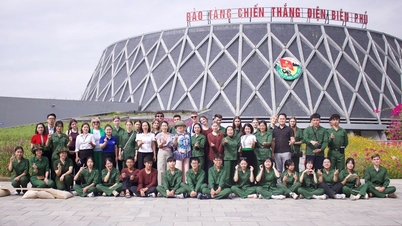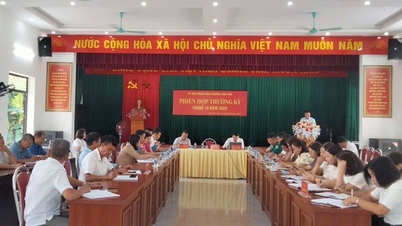No cost to promote State-ordered films
The issue of distributing and disseminating films using the state budget has been discussed for many years. After the success of the film "Peach, Pho and Piano" with a revenue of nearly 21 billion VND after more than 2 months of screening, the distribution and dissemination of films using the state budget has had practical lessons for management agencies to have appropriate mechanisms.

The Department of Cinema is developing and submitting to competent authorities for consideration and promulgation of specific mechanisms and regulations on film distribution and dissemination using the State budget.
According to Ms. Ly Phuong Dung - Deputy Director of the Department of Cinema, we have a complete and comprehensive legal system on cinema. The provisions of the Cinema Law and sub-law documents have mentioned quite fully and clearly the production and dissemination of films using the State budget.
However, the leaders of the Cinema Department pointed out many shortcomings in the distribution and dissemination of films using the State budget. Accordingly, the budget for producing a film is built on the basis of technical and economic norms prescribed in Decision No. 2484/QD-BVHTTDL dated September 21, 2021.
On average, from 2020 to now, each year the State orders 2-3 feature films, 30 documentaries, scientific films and nearly 20 animated films to serve the political mission of celebrating the country's major holidays from the budget of the Ministry of Culture, Sports and Tourism. In which, the unit price for ordering the production of feature films includes direct production costs and 100 million VND for promotion and organization of a film premiere.
From 2011 to 2022, the average State budget allocated for film production orders and film dissemination funding is 65.6 billion/year (of which 500 million VND is for printing film copies, propaganda materials for film weeks, major holidays, making subtitles and printing film copies, propaganda materials for introducing Vietnamese films abroad). This budget is not for promoting a work.
In 2023, the State budget for film production and distribution funding is 98 billion, of which 500 million VND is for film distribution funding to carry out the above task. The budget specifically for film promotion and distribution has not been regulated - Ms. Ly Phuong Dung informed.
"The production cost of films using the state budget cannot keep up with market prices. Films have very high production and promotion costs. Meanwhile, the state budget is quite small and has no separate promotion costs," Ms. Ly Phuong Dung shared.
Faced with difficulties related to the production and dissemination of films using the State budget, a representative of the Department of Cinema proposed that the Ministry of Culture, Sports and Tourism (MOCST) direct advisory and management agencies to continue researching and developing policies and mechanisms to create a solid legal corridor that does not overlap or conflict with issued regulations.

Audiences line up to buy tickets to see the movie Dao, Pho and Piano - a film ordered by the State
Need a removal mechanism
To remove difficulties in releasing, disseminating and promoting films using the State budget, according to Ms. Ly Phuong Dung, the Department of Cinema has proposed that the competent authority consider piloting the payment mechanism as well as building a clear framework and specific budget for disseminating films using the State budget. The Department of Cinema also proposed to supplement regulations to have a basis for performing the task of combining film production from the State budget and socialized sources.
Ms. Ly Phuong Dung said that it is necessary to review relevant regulations for adjustment or coordinate with other ministries and branches to propose adjustments so that the system of legal documents is unified in viewpoints and policies and convenient in application.
Sharing the same view, Associate Professor Dr. Do Lenh Hung Tu, Chairman of the Vietnam Cinema Association, said that the current Cinema Law mentions socialization in the production of films ordered by the State. However, the Government Decree guiding the implementation of the Law does not have any specific regulations on socialization. This creates a bottleneck for this type of film, leading to the phenomenon that films using the State budget or ordered by the State are only shown on holidays and eventually "stored".
According to Mr. Do Lenh Hung Tu, besides the National Cinema Center, most of the cinemas today are privately managed or owned by foreign-invested legal entities. Private cinemas operate under the Enterprise Law and market rules, films with a large audience and high occupancy rates will be retained, and even shown to other cinemas.
Meanwhile, films using the State budget or ordered by the State are picky about audiences, not focusing on entertainment criteria but on propaganda criteria and carrying out political tasks; when they go to the theater, if there is no money to rent the theater and other expenses, it is very difficult for theater owners to organize screenings and this is the bottleneck.

Promoting cinema works on television is necessary to contribute to bringing quality cinema works, ordered by the State, to the masses.
Mr. Do Lenh Hung Tu shared that many films invested by the State, completed and only released to the audience for a very short time, attracting a very small audience because there was no advertising cost for the film when it was released.
"Private producers have invested billions of dong in distribution, while the State only spends at most 100 million dong on a press conference to launch a film, and all costs for advertising and promoting a film before its release are completely non-existent. The film "Peach, Pho and Piano" recently made a splash, but the film crew did not even have time to prepare a poster or trailer for screening," the Chairman of the Cinema Association pointed out the reality.
"Investing in film production but not in promotion and distribution is not consistent. The State should soon thoroughly resolve the bottlenecks so that the cinematographic works ordered and invested in by the State can reach the general public and fully promote the values of the films" - Mr. Do Lenh Hung Tu shared.
In addition, according to the Chairman of the Cinema Association, promoting cinema works on television is necessary to contribute to bringing quality cinema works, ordered by the State, to the masses. Previously, the Saturday Afternoon Cinema program did a very good job of this task. However, for unknown reasons, the program has stopped.
Mr. Do Lenh Hung Tu said that there should be channels to promote State-ordered cinema in particular and Vietnamese cinema in general on television, which is an effective way for cinema to reach a wide audience./.
Source





![[Photo] Prime Minister Pham Minh Chinh chairs the second meeting of the Steering Committee on private economic development.](https://vphoto.vietnam.vn/thumb/1200x675/vietnam/resource/IMAGE/2025/11/01/1762006716873_dsc-9145-jpg.webp)









































































































Comment (0)